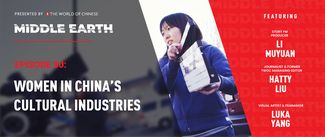Saying about a refreshing summer fruit (and ancient love token)
Choice Chengyu is a regular column, examining interesting, unique or newsworthy examples of chengyu—four-character idioms or proverbs, derived from historical and mythical events.
Today is the Qixi Festival, a “Chinese Valentine’s Day” traditionally marked by gift-exchange between lovers. One notable token of affection was the melon (see below)—hardly a fashionable offering today, but quite appropriate for these dog days of summer.
Be it watermelon, cantaloupe, honeydew, or papaya, these sweet fruits helped people cool down in the age before refrigeration, produced seeds which are fun to crack and eat, and inspired a host of metaphors which have been recorded in chengyu:
瓜熟蒂落 A melon falls off the stem when it is ripe
When a melon is ripe, it falls off the stem naturally. Using this fact as a metaphor, this chengyu means “things will go smoothly when the conditions are right,” or “there’s right time for everything”:
After two years of dating, when the time was ripe, they got married.
Tāmen jīngguò liǎngnián de liàn’ài, zhōngyú guāshú dìluò, jiéwéi zhōngshēn bànlǚ.
他们经过两年的恋爱,终于瓜熟蒂落,结为终身伴侣。
顺藤摸瓜 Follow the vine to get to the melon
Melon grow on vines, and this chengyu is a metaphor for tracking down a person or thing by following a trail of clues:
Following a series of clues, they busted a ring of thieves.
Tāmen shùnténg mōguā, pòhuò le yígè dàoqiè tuánhuǒ.
他们顺藤摸瓜,破获了一个盗窃团伙。
瓜瓞绵绵 Countless big melons and small melons on the same vine
There are usually several melons on a single vine, and in this chengyu, this is a metaphor meaning “to have numerous descendants.” Since traditional Chinese beliefs view a growing family as a blessing, this idiom was written on marriage certificates during the Republic of China in the early 20th century.
滚瓜烂熟 A plump and overripe melon
The character 熟 can mean both “ripe,” when applied to a fruit, and “familiar,” as in having a thorough knowledge of something or someone. Thus, to be like a ripened melon is to have complete mastery of a certain skill:
He has memorized the text thoroughly.
Tā bǎ kèwén bèi de gǔnguā lànshú.
他把课文背得滚瓜烂熟。
瓜田李下 In a melon patch or under a plum tree
A melon patch and the area under a plum tree may not sound like dangerous places, but a folk verse written by Cao Zhi, a famous poet in the third century, suggests it’s unwise to linger there: “瓜田不纳履,李下不整冠。(Don’t bend down to pull your shoes on in a melon patch; don’t out reach to adjust your hat under a plum tree.)” Why? Because others may think you are stealing melons or plums. Thus, this expression became a byword for suspicious circumstances or surroundings:
As they were the only two people in the room, they naturally fell under suspicion.
Fángjiān lǐ zhǐyǒu tāmen liǎngrén, dāngrán nánmiǎn guātiánlǐxià zhīxián.
房间里只有他们两人,当然难免瓜田李下之嫌。
投瓜报玉 Give a jade in return for a melon
Young lovers send each other flowers, chocolates, jewelry, and auspicious numbers of iPhones today—but one poem in the 3,000-year-old Book of Songs tells of a young woman who presents a quince fruit (木瓜, or “wood melon,” in Chinese) to her beloved, who gives her jade in return. Now, this chengyu isn’t exclusive to romance, but means reciprocating someone’s gift with something far more expensive.
Cover image from VCG














